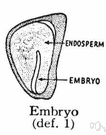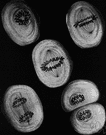embryo
Also found in: Thesaurus, Medical, Idioms, Encyclopedia, Wikipedia.
Related to embryo: embryo transfer, frozen embryo
em·bry·o
(ĕm′brē-ō′)n. pl. em·bry·os
1.
a. The collection of cells that has developed from the fertilized egg of a vertebrate animal, before all the major organs have developed.
b. A collection of such cells of a human, especially from implantation in the uterine wall through the eighth week of development.
2. Botany The young sporophytic plant contained within a seed or an archegonium.
3. An organism at any time before full development, birth, or hatching.
4. A rudimentary or beginning stage: an idea that was the embryo of a short story.
[Medieval Latin embryō, from Greek embruon : en-, in; see en-2 + bruein, to be full to bursting.]
American Heritage® Dictionary of the English Language, Fifth Edition. Copyright © 2016 by Houghton Mifflin Harcourt Publishing Company. Published by Houghton Mifflin Harcourt Publishing Company. All rights reserved.
embryo
(ˈɛmbrɪˌəʊ)n, pl -bryos
1. (Zoology) an animal in the early stages of development following cleavage of the zygote and ending at birth or hatching
2. (Gynaecology & Obstetrics) the human product of conception up to approximately the end of the second month of pregnancy. Compare fetus
3. (Botany) a plant in the early stages of development: in higher plants, the plumule, cotyledons, and radicle within the seed
4. an undeveloped or rudimentary state (esp in the phrase in embryo)
5. something in an early stage of development: an embryo of an idea.
[C16: from Late Latin, from Greek embruon, from bruein to swell]
ˈembryˌoid adj
Collins English Dictionary – Complete and Unabridged, 12th Edition 2014 © HarperCollins Publishers 1991, 1994, 1998, 2000, 2003, 2006, 2007, 2009, 2011, 2014
em•bry•o
(ˈɛm briˌoʊ)n., pl. -os,
adj. n.
1. an animal in the early stages of development in the womb or egg; in humans, the stage approximately from attachment of the fertilized egg to the uterine wall until about the eighth week of pregnancy. Compare fetus, zygote.
2. the rudimentary plant usu. contained in the seed.
3. the beginning or rudimentary stage of anything.
adj. 4. embryonic.
[1580–90; < Medieval Latin embryō, s. embryōn- < Greek émbryon=em- em-2 + -bryon, derivative of brýein to be full, swell, teem with (compare brýon catkin)]
embryo-
a combining form representing embryo: embryology.
Also, esp. before a vowel,embry-.Random House Kernerman Webster's College Dictionary, © 2010 K Dictionaries Ltd. Copyright 2005, 1997, 1991 by Random House, Inc. All rights reserved.
em·bry·o
(ĕm′brē-ō′)1. An animal in its earliest stages of development, especially in the uterus of female mammals, or, in egg-laying animals, an animal developing in the egg until it is hatched.
2. A plant in its earliest stages of development, especially the miniature, partially developed plant contained within a seed. When conditions are right for germination, the embryo begins to grow and bursts through the seed coat.
embryonic (ĕm′brē-ŏn′ĭk) adjective
The American Heritage® Student Science Dictionary, Second Edition. Copyright © 2014 by Houghton Mifflin Harcourt Publishing Company. Published by Houghton Mifflin Harcourt Publishing Company. All rights reserved.
embryo
1. A plant or animal that is at an early stage of its development.
2. A young animal in an early phase of development. In humans the phase lasts from the third through the eighth week after fertilization.
Dictionary of Unfamiliar Words by Diagram Group Copyright © 2008 by Diagram Visual Information Limited
ThesaurusAntonymsRelated WordsSynonymsLegend:
Switch to new thesaurus
| Noun | 1. |  embryo - (botany) a minute rudimentary plant contained within a seed or an archegonium embryo - (botany) a minute rudimentary plant contained within a seed or an archegonium |
| 2. |  embryo - an animal organism in the early stages of growth and differentiation that in higher forms merge into fetal stages but in lower forms terminate in commencement of larval life embryo - an animal organism in the early stages of growth and differentiation that in higher forms merge into fetal stages but in lower forms terminate in commencement of larval lifeanimal, animate being, beast, creature, fauna, brute - a living organism characterized by voluntary movement blastosphere, blastula - early stage of an embryo produced by cleavage of an ovum; a liquid-filled sphere whose wall is composed of a single layer of cells; during this stage (about eight days after fertilization) implantation in the wall of the uterus occurs gastrula - double-walled stage of the embryo resulting from invagination of the blastula; the outer layer of cells is the ectoderm and the inner layer differentiates into the mesoderm and endoderm morula - a solid mass of blastomeres that forms when the zygote splits; develops into the blastula umbilical, umbilical cord - membranous duct connecting the fetus with the placenta |
Based on WordNet 3.0, Farlex clipart collection. © 2003-2012 Princeton University, Farlex Inc.
embryo
noun
1. foetus, unborn child, fertilized egg The embryo lives in the amniotic cavity.
Collins Thesaurus of the English Language – Complete and Unabridged 2nd Edition. 2002 © HarperCollins Publishers 1995, 2002
embryo
nounThe American Heritage® Roget's Thesaurus. Copyright © 2013, 2014 by Houghton Mifflin Harcourt Publishing Company. Published by Houghton Mifflin Harcourt Publishing Company. All rights reserved.
Translations
جَنينفي طَوْر الجَنين، في المَرْحَلَةِ الأولى
embryofosterfoster-i sin vorden
embrió
á frumstigifósturvísir; plöntufóstur, kím
embriologasembriologijaembriologinisembrionasembrioninis
embrija-embrijsiedīgļa-iedīglissākuma stadija
embryo
başlangıçembriyonoğulcuk
Collins Spanish Dictionary - Complete and Unabridged 8th Edition 2005 © William Collins Sons & Co. Ltd. 1971, 1988 © HarperCollins Publishers 1992, 1993, 1996, 1997, 2000, 2003, 2005
embryo
[ˈɛmbriəʊ]Collins English/French Electronic Resource. © HarperCollins Publishers 2005
Collins German Dictionary – Complete and Unabridged 7th Edition 2005. © William Collins Sons & Co. Ltd. 1980 © HarperCollins Publishers 1991, 1997, 1999, 2004, 2005, 2007
Collins Italian Dictionary 1st Edition © HarperCollins Publishers 1995
embryo
(ˈembriəu) noun – plural ˈembryos –1. a young animal or plant in its earliest stages in seed, egg or womb. An egg contains the embryo of a chicken; (also adjective) the embryo child.
2. (also adjective) (of) the beginning stage of anything. The project is still at the embryo stage.
ˌembryˈology (-ˈolədʒi) noun the science of the formation and development of the embryo.
ˌembryoˈlogical (-ˈlo-) adjectiveˌembryˈologist noun
ˌembryˈonic (-ˈonik) adjective
in an early stage of development.
Kernerman English Multilingual Dictionary © 2006-2013 K Dictionaries Ltd.
em·bry·o
n. embrión;
fase primitiva de desarrollo del ser humano desde la concepción hasta la séptima semana;
organismo en la fase primitiva de desarrollo;
___ transfer after vitro fertilization → transferencia de un___ logrado después de fertilización artifícial.
English-Spanish Medical Dictionary © Farlex 2012
embryo
n (pl -os) embrión mEnglish-Spanish/Spanish-English Medical Dictionary Copyright © 2006 by The McGraw-Hill Companies, Inc. All rights reserved.
